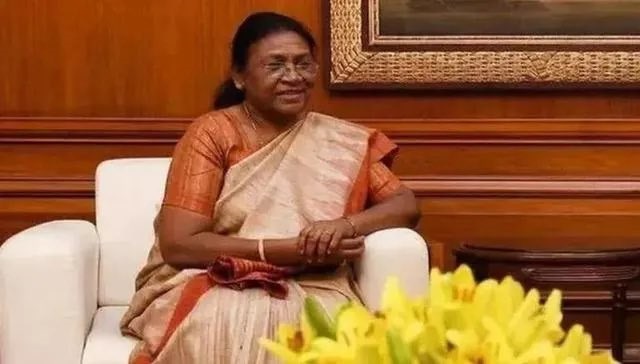
Murmu's hometown Rairangpur has fond memories of 'Droupadi didi'

Every morning, Rasananda Lenka, 91, a senior advocate in Rairangpur, Odisha, goes for a short walk and does yoga before heading to his workplace — the sub divisional court, barely 200 metres away from his house.
Lenka’s agility, memory and fun loving attitude belies his age. Sporting a boyish grin, the ex-councilor of the sleepy Rairangpur town in Odisha’s tribal dominated Mayurbhanj district announces: “I am the oldest surviving councillor and a proud resident of the hometown of India’s next President, Droupadi Murmu.”
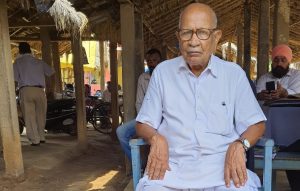
Sitting on the highway connecting the district headquarters town Baripada with Jamshedpur, the hitherto lesser known Rairangpur, which graduated to a municipality in 2014, has been in the news following the announcement of Murmu as the BJP led National Democratic Alliance’ (NDA) presidential candidate.
With the Opposition struggling to gather enough numbers for its candidate Yashwant Sinha, it is almost a given than Murmu would become the next President, on July 18, 2022. She will be the first President hailing from a tribal community.
Pride and joy
At her hometown, Lenka and other political opponents of Murmu are rejoicing. And there is a sense of pride in all, too.
“I am more happy than Droupadi Murmu. After all, she belongs to my Santhal tribe,” says ex-Congress MLA from Rairangpur, Laxman Majhi. Incidentally, it was Majhi who lost to Murmu in the 2000 Assembly elections. However, they still maintain cordial relations.
Majhi remembers that when his wife died in Bhubaneswar in 2000, Murmu had visited their family and offered support. She had also invited him to her oath taking ceremony as Jharkhand’s Governor.
“I wish her all luck. If she becomes the President, it will be a new chapter for the entire tribal community,” says Majhi.
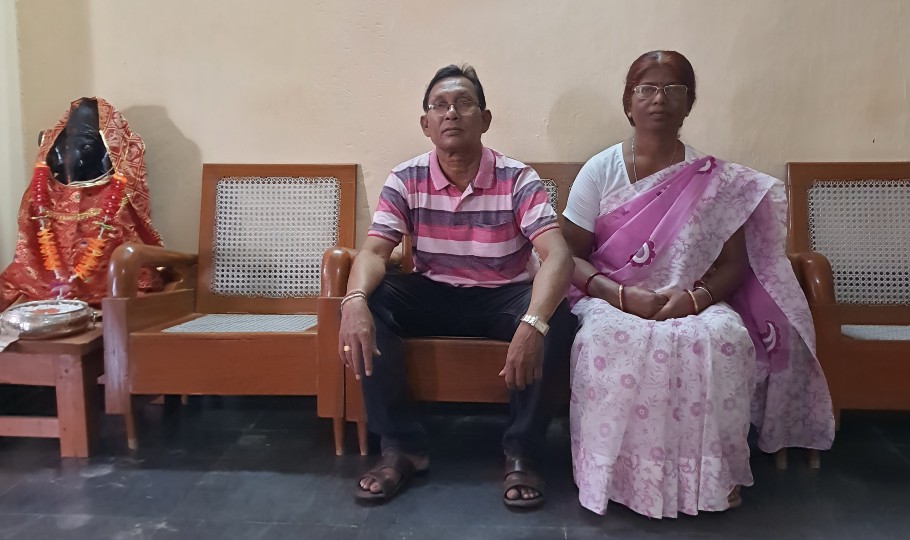
Murmu was born on June 20, 1958 in Uperbeda, a village under Kusumi block, about 20 km away from Rairangpur. But it’s Rairangpur from where her political career took off. She came here in the early 1990’s. Along with her younger brother, Taranisen Tudu and his wife Sakramani Tudu, she lived in her two storey house in Mahuldiha, a locality in Rairangpur.
Murmu won her first election in 1997 and became a councillor and then vice-chairperson in the Rairangpur notified area council. Subsequently, she was a two-time BJP MLA from the Rairangpur Assembly seat, a minister (2000-04) in the Naveen Patnaik led (BJD-BJP alliance) government. From 2015 till July 2021, she was the Jharkhand Governor.
A punctual, affectionate teacher
Prior to her tryst with politics, for four years from 1997, Murmu taught as an honorary teacher at a school, the Sri Aurobindo Integral Education and Research Centre, in this town.
One of her colleagues at this school, Indira Otta, shares some memories. “Murmu didi (sister) was very punctual, soft spoken, affectionate and fond of students. On school functions and other occasions, she would be the first to arrive and help others in all the activities. She’s a dedicated and complete team person,” recalls Otta, who went on to become the principal of the school.
Many still remember the days when, as municipality vice-chairperson, Murmu, carrying an umbrella, would oversee sanitation activities. The residents of the town speak about her as a person of high integrity and moral standards.
School days
“There was a well inside our school compound. For drinking purposes, students and staff would collect water from it, using the only iron bucket with a rope,” recalls Basudev Behera, 72, Murmu’s teacher at the Uperbeda upper primary school. Once, while some girls were drawing water, the bucket fell inside the well. Scared, they decided to keep it secret.
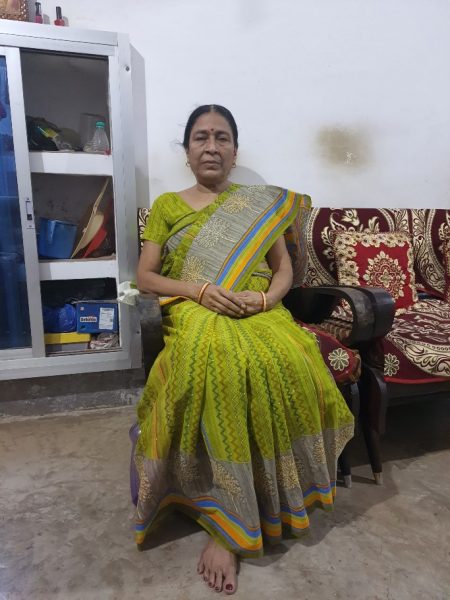
“However, it’s Droupadi, who came to us and said the truth. Otherwise, we wouldn’t have known about the lost bucket,” says Behera, who lives in Tantoposi village under Uperbeda panchayat.
According to Behera, Murmu was the class monitor and performed well both in studies and extra-curricular activities (she was class topper, ran fast and recited poems beautifully). She had all the qualities which make one a decent human being, he said.
“Whenever we (teachers) discussed about students in leisure time, everyone had a word of praise for Droupadi, we knew she would prove her mettle in life,” says a visibly overjoyed Behera.
But despite the rosy picture, she has suffered setbacks. Between 2009 and 2015, Murmu lost her husband, two sons, her mother and brother.
Lenka, who went to meet Murmu after she was made the presidential candidate, says, “There was a huge crowd of well wishers. She made me sit next to her. I just said that God is not unkind. She replied, it’s all God’s wish.”
A staunch Congress supporter, Lenka has had a long association with politicians. He speaks volumes of ex-Odisha chief minister Biju Patnaik, father of incumbent Naveen Patnaik. In his opinion, one of the rare qualities of Murmu is that she carries no political bias in social circles or meetings.
“Despite knowing well that I am against her party and its ideologies, she has always been courteous and respectful to me. For us she will always be Mayurbhanj’s daughter,” says the nonagenarian.
Can be tough, too
Everyone who knows Murmu or worked and interacted with her, says that she is extremely humble and accessible, she listens to people patiently and tries her best to extend all support. “There’s no anger in her,” says Otta.
However, former Bihar and then Jharkhand cadre IAS officer, Santosh Kumar Satpathy, who for two years served as principal secretary to Murmu when she was the governor, begs to differ. “She is a woman of very strong convictions and can be very hard at times when it comes to right and wrong.”
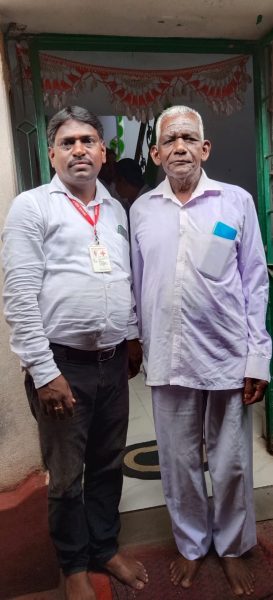
Referring to an incident when she refused to give assent to Bills approved by the Assembly seeking amendments to the Chotanagpur Tenancy Act (CNT), 1908, and the Santhal Pargana Tenancy Act (SPT), 1949, Satpathy recalls Murmu say, “I would rather go back to my community than to do something against the community.”
With land being their only source of livelihood, there were widespread agitations by tribals all over the state against the controversial bills. While sending the Bills back to the government, Murmu is said to have asked the Jharkhand government how tenancy land amendments would help the masses.
She also forwarded the 192 protest petitions that the Raj Bhavan had received from various organisations against the proposed amendments.
“She wouldn’t bulk under pressure, come what may,” Satpathy says. “I have seen very few people like her.”
As Governor, Murmu gave priority to children’s healthcare and education. She made it a point to visit all the nearly 200 Kasturba Gandhi Balika Vidyalayas (residential schools for girls belonging to SC, ST, OBC and minorities).
“In every school, in the presence of the district collector and SP, she would settle the issues and if required, would speak to the chief minister and solve the problems of the students,” says Satpathy.
As Rairangpur gears up for celebrations, Behera says, “The wishes of the people and blessings of teachers and elders, are and will be with her always.”


